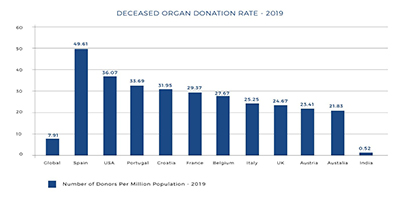Date: 20/02/2023
Relevance: GS-2: Welfare schemes for vulnerable sections of the population by the Centre and States
Key Phrases: domicile-related restrictions, Organ Donation, opt-out system, Transplantation of Human Organs and Tissues Act, of 1994, dysfunctional organ.
Context:
- The centre has made major changes in the organ transplant regulations in the country under its ‘one nation, one organ allocation policy’ rule by removing the 65-year age cap for recipients and allowing them to register in any state and not just their state.
-
Senior citizens in this age group can now register to receive donations from live donors.
Key Highlights:
- According to health ministry sources, three significant changes have been introduced under the organ donation rules.
- The changes were made to provide better access to organs and also promote cadaver donations in the country, which is significantly less in number at the moment.
- One of the provisions that have been changed is that now any recipient can register in any state of their choice for an organ transplant. Now, the registry will be pan-India and not state-specific.
- Earlier, some states either registered recipients who lived there or accorded priority to them in allocating organs.
- States such as Maharashtra, Kerala, Gujarat, and Telangana charge between Rs 5,000 and Rs 10,000 to register patients who need organ replacement.
- The health ministry has directed these states to stop charging this fee.
- India conducts the third-highest number of transplants in the world every year.
- Yet barely four percent of the patients who require a liver, heart or kidney transplant manage to get one.
- The percentages are very likely to go up once the changes in the rules announced recently take effect.
What is Organ Donation?
- Organ donation is a vital practice that allows people to give away their healthy organs after death to people in need, who are medically the right fit for receiving organ transplants.
- An organ transplant is a process involving replacing the patient’s dysfunctional organ or tissue with a healthy organ from a donor, thus ensuring that the organ can continue to do its job inside the human body.
- A single organ donor can donate up to twenty-five different organs and tissues for transplant.
- Cumulatively, these organs and tissues have the potential to save eight different lives! Kidneys, the liver, pancreas, lungs, and heart are the usual donatable organs.
- Donatable tissues include tissues of eyes, skin, bone, bone marrow, nerves, brain, heart valves, eardrum, ear bones, and blood.

Do You Know?
- The number of organ transplants has increased from 4,990 in 2013 to 15,561 in 2022.
- The total number of kidney transplants from living donors has increased from 3,495 in 2013 to 9,834 in 2022 and from deceased donors, it has increased from 542 to 1,589 in 2022.
- The total number of liver transplants from living donors has increased from 658 in 2013 to 2,957 in 2022 and from 240 to 761 in 2022 from a deceased donor.
- The total number of heart transplants has increased from 30 in 2013 to 250 in 2022 while lung transplants from 23 to 138.
Country’s Organ Transfer Law
- The country’s organ transfer law recognises donations by the patient’s close relatives — parents, spouses, and siblings.
- In case, a near relative is medically incompatible with the recipient, the pair is permitted a swap transplant with another related unmatched pair.
- But by all accounts, a majority of organ donations in the country are not by the close kin of patients.
- Such donors have to convince a screening committee of their altruistic motives.

Challenges in Organ Donation:
- Lack of Awareness: A crippling lack of awareness and a shroud of
superstitions that are drawn over the Indian population is major reasons for
the unavailability of organs in the country.
- Some have religious superstitions like in the next birth they won’t get the organ they donate.
- Lack of Trust: There is also a lack of trust between the
patient’s family and the medical professionals.
- Families are often worried that if they give their consent for donating the organs of the patient, the doctors will not try as hard to save him/her.
Way Forward:
- Besides bringing major changes in the rules, the union health ministry also plans to create massive awareness, especially among school children.
- Officials have suggested introducing a chapter on organ donation in the school curriculum and medical education.
- Regular scams have shone the light on a black market that lures the desperately poor to sell their organs, while disguising the transaction as altruistic.
- Suggestions to make the proceedings of the committees more transparent have largely been ignored by authorities.
- But the country’s growing burden of lifestyle diseases means that such tasks cannot be put off for long.
- Increasing the pool of organs will require regulatory creativity without compromising on ethical imperatives.
- The opt-out system — It assumes all citizens to be donors unless they “opt-out” — adopted in some Western countries may not be apt for a country such as India, where awareness of organ donation is low. But this can definitely be a solution in the coming future.
Conclusion:
- The organ shortage problem is, however, a complex one, that continues to confound planners, even in nations whose healthcare systems are far better equipped than that of India.
- However, the recent changes to the organ transplant rules announced by the Union health ministry are small, but significant, steps towards giving a new lease of life to many people with failing organs.
Source: The Indian Express
Mains Question:
Q. Discuss the organ transplant rules in India. Why Changes in organ transplant rules was important? (250 Words).






















